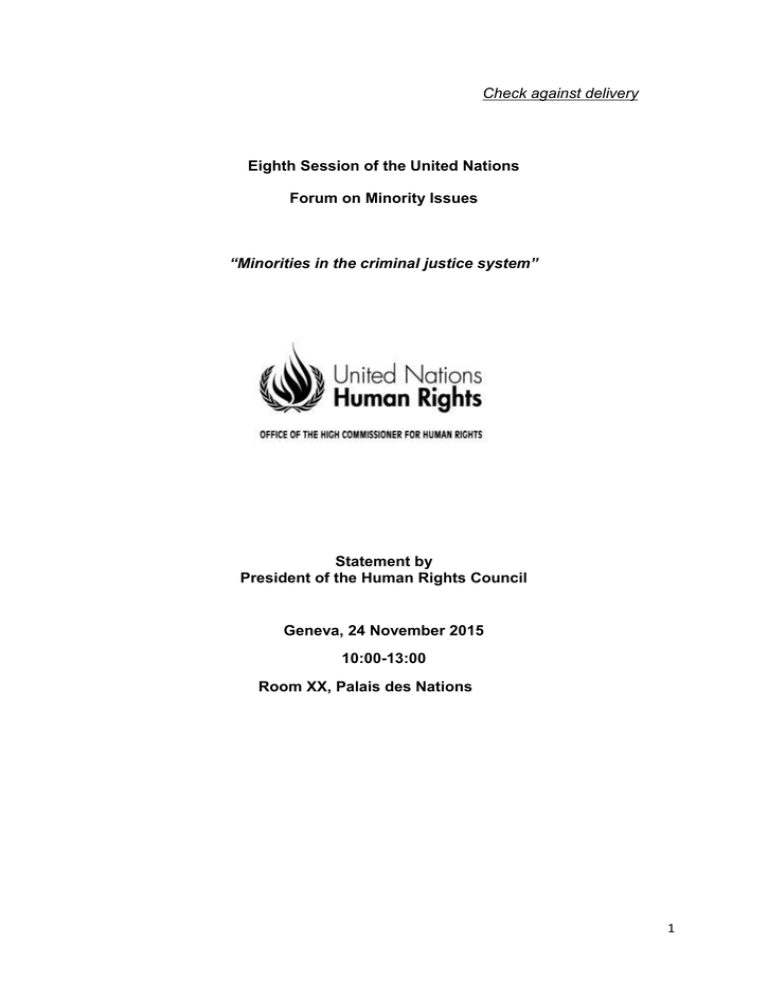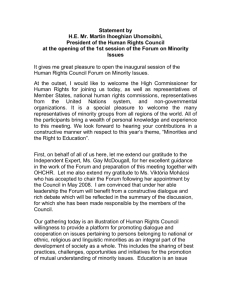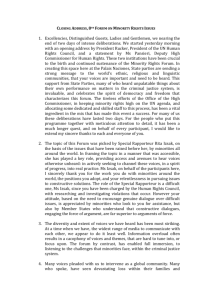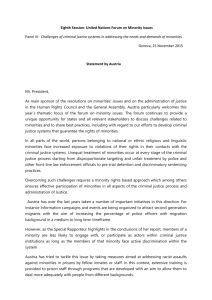“Minorities in the criminal justice system” Forum on Minority Issues
advertisement

Check against delivery Eighth Session of the United Nations Forum on Minority Issues “Minorities in the criminal justice system” Statement by President of the Human Rights Council Geneva, 24 November 2015 10:00-13:00 Room XX, Palais des Nations 1 Mister Chairperson, Distinguished delegates and participants, Ladies and Gentlemen, It is a great honour for me to hereby open the eighth session of the Forum on Minority Issues on “minorities in the criminal justice system”. I would like to warmly welcome Mr. Joshua Castellino, who has kindly accepted the important task of chairing this session of the Forum. Mr. Castellino your extensive experience on the issues to be discussed will contribute to making this Forum a success. I also welcome and thank Ms. Rita Izsák, the Special Rapporteur on minority issues, who, as in previous years, has provided important guidance to the work of this Forum, and assisted in the preparation of its annual sessions. I would also like to welcome representatives of Member States, United Nations specialized agencies, representatives of human rights mechanisms, international and regional organizations, national human rights institutions, as well as non-governmental organizations, academics and experts. Every year, this Forum discusses some of the key challenges and issues affecting minorities globally, in a spirit of open dialogue and mutual respect and understanding. These discussions cannot be meaningfully addressed without the full and effective participation of minorities themselves. I am thus very pleased that this Forum provides such an opportunity and therefore I would like to extend a warm welcome to those of you here today representing your communities. I am confident that your deep understanding of the important issues at stake on the ground will be an essential contribution to this year’s Forum’s discussions. Twenty years have passed since United Nations Member States made a commitment to confront the global challenges facing minorities around the world, through the establishment of the Working Group on Minorities: the first dedicated United Nations mechanism to focus exclusively on Minority Rights. In 2007 the Working Group was replaced by the Forum on Minority Issues, established by the 2 Human Rights Council through its resolution 6/15. The Forum aims at providing an enhanced platform for promoting dialogue and cooperation among all stakeholders from within and outside the UN system on issues pertaining to persons belonging to national or ethnic, religious and linguistic minorities. Over the past twenty years there have been notable achievements regarding the promotion and protection of the rights of minorities. Nevertheless, deficits remain, including in the field of criminal justice. In too many instances it is clear that while criminal laws may on their face prohibit discrimination, in practice, these laws are often applied differently for certain minorities, compared to dominant groups. In particular, many aspects of the administration of criminal justice allow for a wide discretion. And it is in the exercise of this discretion that discrimination against racial, ethnic, religious or linguistic minorities may lurk. The impact of this can be severe, resulting in higher rates of arrest, pre-trial detention, higher rates of criminal conviction, and imposition of longer sentences for minorities, but to name a few of the concerns. The Human Rights Council and subsidiary mechanisms remain committed to combating discrimination against minorities wherever it exists and to promoting equality for all and in all fields of life, particularly for those most marginalized. Therefore, as President of the Human Rights Council I welcome the attention of this Forum given to the important but complex issue of discrimination against minorities in the administration of criminal justice. In this respect, let me also commend the work of all Special Procedures mandate–holders, including the Special Rapporteur on minority issues, for addressing specific minority concerns in their substantive reports, including through tackling the issues of unlawful stop and search on the basis of minority identity, or discrimination against minorities during arrest, detention, prosecution, conviction or imprisonment, and for providing the Human Rights Council with concrete recommendations on how to prevent and address such cases. The work of the Council’s Universal Periodic Review also provides a concrete opportunity for States to openly discuss actions that they have undertaken to 3 improve the human rights situations in their countries and to fulfil their human rights obligations, including concerning the fairness and effective safeguarding of minority rights at all stages of the criminal justice system. This session of the Forum in addressing these complex issues of minorities in the criminal justice system, can further contribute to identifying practical ways in which together we can achieve the objectives of ensuring inclusive, harmonious, multi-ethnic and multi-faith societies in which all may live peacefully, in security and equality before and under the law. I therefore look forward to the recommendations of this session which will be presented by the Special Rapporteur on minority issues to the Human Rights Council in March 2016. As President of the Human Rights Council, I continue to receive allegations of reprisals and intimidation against individuals and groups cooperating with the United Nations, its representatives and mechanisms in the field of human rights, and against their families and legal representatives. In this connection I would like to recall that the Secretary General has stated in his 2015 Report on reprisals that any act of intimidation and reprisal “is completely unacceptable and must be halted, immediately and unconditionally”. Ultimately, such acts undermine the legitimacy and credibility of the international human rights institutions, including this Forum. Chairperson, Ladies and Gentlemen, I wish you all a fruitful, constructive and inter-active dialogue over the next two days and another successful Forum on Minority Issues. Thank you. 4


